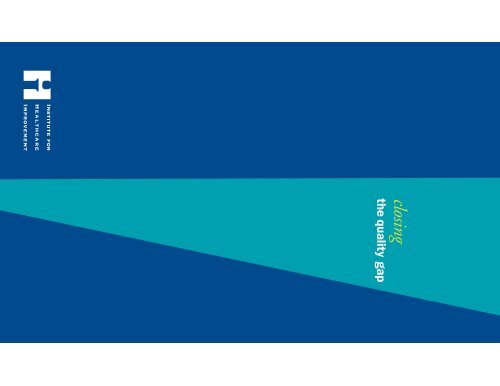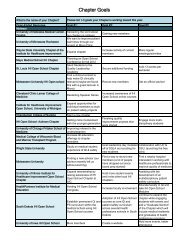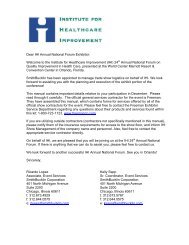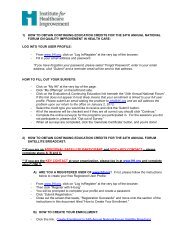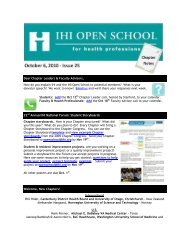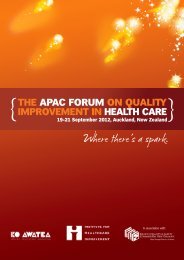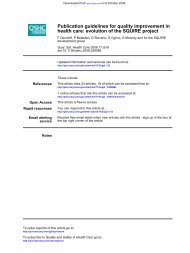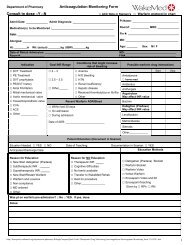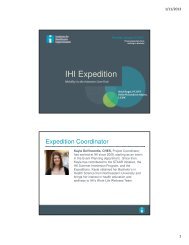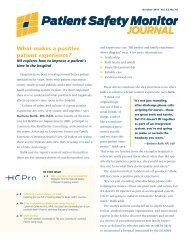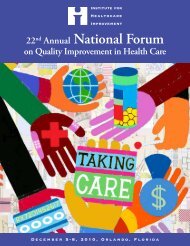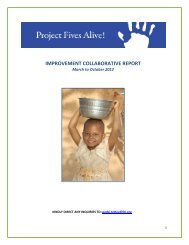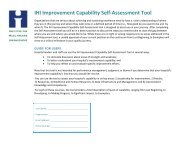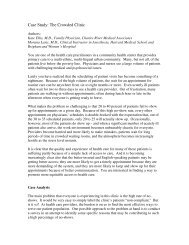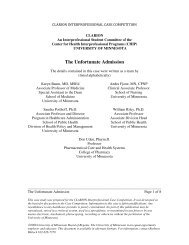Closing - Institute for Healthcare Improvement
Closing - Institute for Healthcare Improvement
Closing - Institute for Healthcare Improvement
You also want an ePaper? Increase the reach of your titles
YUMPU automatically turns print PDFs into web optimized ePapers that Google loves.
closing<br />
the quality gap
T H E I N S T I T U T E F O R<br />
H E A LT H C A R E I M P ROV E M E N T<br />
( I H I ) is an independent not-<strong>for</strong>-profit<br />
organization helping to lead the improvement<br />
of health care throughout the world.<br />
Founded in 1991 and based in Cambridge,<br />
Massachusetts, IHI works to accelerate<br />
improvement by building the will <strong>for</strong><br />
change, cultivating promising concepts <strong>for</strong><br />
an introduction to IHI<br />
improving patient care, and helping health<br />
care systems put those ideas into action.<br />
Employing a staff of approximately 100<br />
people and maintaining partnerships with<br />
hundreds of faculty members, IHI offers<br />
comprehensive programs that aim to<br />
improve the lives of patients, the health<br />
of communities, and the joy of the health<br />
care work<strong>for</strong>ce.<br />
IHI’s work is funded primarily through our<br />
own fee-based programs and services, and<br />
also through the generous support of a<br />
distinguished group of foundations,<br />
companies, and individuals. These sources<br />
enable us to provide community benefits<br />
such as program scholarships, research<br />
and development, work in professional<br />
education, and initiatives in developing<br />
countries.
We are in the midst of an unprecedented groundswell of excitement<br />
and commitment <strong>for</strong> effective change, with more health care leaders than ever<br />
be<strong>for</strong>e ready to find alternatives to the status quo.<br />
H E A LT H C A R E is a highly complex system, vastly underper<strong>for</strong>ming its<br />
potential, and with many broken parts. But <strong>for</strong> every broken part in our system,<br />
This is a remarkable time<br />
<strong>for</strong> those of us intent on<br />
improving health care.<br />
there are examples of excellence – organizations that have overcome obstacles<br />
and redesigned patient care. The challenge is to make these examples the rule,<br />
not the exception, so that all patients reliably receive the best care possible.<br />
To be sure, there is a sizable gap between what health care achieves today<br />
and what it could achieve at the same or lower cost. This gap is so large<br />
that the <strong>Institute</strong> of Medicine (IOM) declares it a “ C H A S M .”<br />
Crossing this chasm will require massive change.<br />
This is where IHI comes in.
Improving health care is IHI’s mission,<br />
its promise, and its daily work.<br />
It starts with will...<br />
We aim to improve the lives of patients, the health of communities, and the joy<br />
of the health care work<strong>for</strong>ce by focusing on an ambitious set of goals adapted<br />
from the IOM’s six improvement aims <strong>for</strong> the health care system – care that is safe,<br />
effective, patient-centered, timely, efficient, and equitable. We call this the<br />
“No Needless List”:<br />
No Needless Deaths<br />
No Needless Pain or Suffering<br />
No Helplessness in Those Served or Serving<br />
No Unwanted Waiting<br />
No Waste<br />
No One Left Out<br />
IHI works with health professionals throughout the world to accelerate the<br />
measurable and continual progress of health care systems toward these bold<br />
objectives, leading to breakthrough improvements that are truly meaningful in<br />
the lives of patients.<br />
S I N C E 1 9 9 1 , IHI has been reigniting health care professionals’ passion<br />
<strong>for</strong> their work. Together we challenge the status quo, envision a better future,<br />
and gain courage, commitment and companionship <strong>for</strong> a journey of continuous<br />
improvement toward that future.<br />
Now, there is mounting momentun <strong>for</strong> change...<br />
and there is no turning back.<br />
Q U A L I T Y I M P R O V E M E N T is no longer a fringe philosophy in<br />
health care. It is now the mainstream approach <strong>for</strong> ensuring that the best<br />
possible care is delivered to every patient every day – and it is rapidly taking<br />
its rightful place in the core business strategy <strong>for</strong> institutions trying to survive<br />
in an increasingly competitive marketplace.<br />
IHI’s National Forum on Quality <strong>Improvement</strong> in Health Care is our most<br />
powerful event <strong>for</strong> building the will <strong>for</strong> change. This annual conference is<br />
renowned as a potent source of inspiration and in<strong>for</strong>mation that helps organizations<br />
begin or renew their commitment to effective and lasting improvement.<br />
We do this by:<br />
• Building the will <strong>for</strong> change<br />
• Cultivating promising improvement ideas<br />
• Putting those ideas into action through<br />
effective execution<br />
“<br />
The improvement of any system<br />
”<br />
requires three elements:<br />
will, ideas, and execution.<br />
T h o m a s N o l a n , P h D<br />
I H I S e n i o r F e l l o w
Add some powerful ideas...<br />
All improvement requires change, but not all change is improvement. Knowing<br />
the difference between good changes and ineffective ones requires intellectual<br />
discipline and honesty. With a foundation of evidence, facts, and science,<br />
IHI cultivates and spreads wise changes that help improve the lives of patients<br />
and communities.<br />
A F O U N D AT I O N O F S C I E N C E<br />
Best practices in health care, whether they emerge from <strong>for</strong>mal research or from<br />
the practical experiences of innovators, often spread far more slowly than they<br />
should. IHI aims to get research into practice as quickly as possible to ensure<br />
that every patient receives care based on the best possible knowledge base.<br />
Examples include:<br />
Ventilator Bundle A bundle is a collection of effective care processes<br />
reliably combined to improve patient outcomes. The“Ventilator Bundle,”<br />
perhaps IHI’s best known example, has stimulated the widespread<br />
adoption of scientifically grounded elements of effective ventilator<br />
care. In some cases, this has virtually eliminated ventilator-associated<br />
pneumonia, according to reports we have collected from dozens<br />
of hospitals.<br />
Applying Operations Research to Health Care One highly<br />
leveraged way to eliminate ambulance diversions and reduce waiting<br />
in the emergency department is, believe it or not, to manage variability<br />
in elective admissions. Operations research proves it. IHI has used this<br />
discipline, under the leadership of Eugene Litvak, PhD, to help hospitals<br />
improve patient flow throughout the acute care setting.<br />
D I S C I P L I N E D R E S E A R C H A N D D E V E L O P M E N T<br />
When the old ways stop working — or never really did work — it’s time <strong>for</strong> new<br />
ideas. IHI maintains disciplined R&D processes and prototyping projects to seek<br />
out new solutions and groundbreaking ideas. Examples include:<br />
Transitions Home A comprehensive, reliable discharge plan, along<br />
with post-discharge support, can reduce readmission rates and improve<br />
health outcomes. This is an area of extensive prototyping work in<br />
Trans<strong>for</strong>ming Care at the Bedside (TCAB), a program of IHI and<br />
The Robert Wood Johnson Foundation that aims to improve care<br />
and staff satisfaction dramatically on medical/surgical units.<br />
Trigger Tool One way <strong>for</strong> hospitals to measure patient harm is through<br />
retrospective review of patient records using “triggers” (or clues) to identify<br />
patients with adverse events. This approach began in IHI’s initiative,<br />
“Idealized Design of the Medication System.” IHI researchers and others<br />
have broadened the application to support estimation of harm levels across<br />
entire systems, and are working to evaluate and improve this tool.<br />
C A R E F U L F I E L D T E S T I N G<br />
Widespread improvement requires that many people and institutions test<br />
changes in local settings, proceeding with both caution and urgency to implement<br />
promising changes. IHI helps facilitate these processes of learning, local research,<br />
and adaptation. Examples include:<br />
Rapid Response Rapid Response Teams can be called upon to<br />
intervene quickly when a patient’s condition first begins to deteriorate.<br />
IHI learned this idea first from Kenneth Hillman, MD, and his colleagues<br />
in Australia. We facilitated further research, adaptation, and adoption.<br />
Medication Reconciliation Adverse drug events can be reduced<br />
by reconciling medication plans at all transitions in care. This<br />
common-sense idea was pioneered at Luther Midel<strong>for</strong>t in the Mayo<br />
Health System, among others. IHI helped refine the design and<br />
encouraged broad-scale deployment.
...Then take action <strong>for</strong> results<br />
Will and ideas will not succeed without a reliable system <strong>for</strong> execution.<br />
Among IHI’s key contributions is the merger of inspiration and promising change<br />
concepts with reliable methods <strong>for</strong> making sustainable change at the front line of<br />
care. With the assistance of our colleagues at Associates in Process <strong>Improvement</strong>,<br />
IHI helps put good ideas into action by applying proven quality improvement<br />
tools and assessing progress through systematic measurement.<br />
The power of these elements working together – will, ideas and execution –<br />
leads to meaningful, measurable, and lasting improvements in care, and in the<br />
lives of both patients and providers.<br />
Here are examples of how innovative ideas have led to powerful results<br />
as reported to us by some of the organizations with which we’ve worked:<br />
No cases of ventilator-associated pneumonia in over two years.<br />
Dominican Hospital, Santa Cruz, CA<br />
The use of beta blockers among patients at risk <strong>for</strong> a cardiac event<br />
increased from 25% to 100%. NHS Tayside, Scotland<br />
Average time from ED arrival to an inpatient bed is less than three hours.<br />
Bellin Health Services, Green Bay, WI<br />
“<br />
Our industry will be led into its future<br />
by a minority of organizations and professionals<br />
who have achieved a level of per<strong>for</strong>mance<br />
that nobody else has.<br />
”<br />
D o n a l d B e r w i c k , M D , M P P, I H I P r e s i d e n t a n d C E O<br />
Central line patients infection free <strong>for</strong> 14 months.<br />
Overlake Hospital, Bellevue, WA<br />
Percent of patients with all medications reconciled on admission rose<br />
from 47% in 2005 to 95% in 2006.<br />
Contra Costa Regional Medical Center, Martinez, CA<br />
Waiting time <strong>for</strong> an appointment was reduced from 41 days to same day.<br />
Neshobe Family Medicine, Porter Hospital, Middlebury, VT<br />
Number of patients receiving antiretroviral treatment rose from 166 in<br />
October 2004 to 1,500 in September 2006. Harriet Shezi Paediatric ARV<br />
Clinic, Soweto, South Africa<br />
Average number of times per shift that a nurse leaves a patient’s bedside<br />
to obtain supplies decreased from three to one. ThedaCare, Appleton, WI
Changing health care together<br />
IHI’s programs and activities connect people from around the<br />
world in an ever-evolving learning system based on a philosophy of<br />
“A L L T E A C H , A L L L E A R N . ”<br />
This system enables committed individuals and organizations to collaborate on<br />
the hard, rewarding work of improving health care – because it is far easier to<br />
improve together than it is alone.<br />
DISSEMINATION STRATEGY<br />
1,000,000s<br />
The diagram on the following page depicts IHI’s strategy <strong>for</strong> trans<strong>for</strong>ming health<br />
care. We begin at the core by refining existing solutions and inventing new ones<br />
with a small number of <strong>for</strong>ward-thinking organizations. Then we expand the<br />
learning through strategic relationships and memberships. Next, we create<br />
connections and share knowledge through face-to-face learning opportunities.<br />
Finally, we spread knowledge to the world through campaigns, the web,<br />
professional education, and fellowship programs.<br />
I N N O VAT I O N<br />
At the center of our work is the creation and testing of new ideas – novel concepts<br />
<strong>for</strong> improving patient care. Here, we work intensely with a handful of cutting-edge<br />
organizations on a project basis to test new solutions to old problems, to “get out<br />
of the box.” This is our research and development function, the innovation engine<br />
that fuels all of our work.<br />
S T R A T E G I C R E L A T I O N S H I P S<br />
Once a promising change concept has been successfully developed in one setting,<br />
it needs to be fully vetted and piloted in other settings. IHI maintains a variety of<br />
closely aligned, strategic relationships with dozens of organizations that work with<br />
us to test and deploy these changes. The most common types of relationships are:<br />
K N<br />
S T R AT E G<br />
L E A R N I N G<br />
O W<br />
L E<br />
D G<br />
INNOVATION<br />
I C<br />
E<br />
1,000s<br />
100s<br />
10s<br />
R E L AT<br />
I P S<br />
I O N S H<br />
O P P O R T U N I T I E S<br />
F<br />
O R<br />
T H<br />
E<br />
W O<br />
D<br />
R L<br />
• Strategic Partnerships<br />
These are high-level relationships focused on trans<strong>for</strong>ming entire systems of<br />
care by concentrating on strategic objectives and system-level improvement.<br />
In addition to working closely with several major health care systems in the
United States, IHI is also involved in strategic-level ef<strong>for</strong>ts with providers<br />
in the UK, Sweden, Malawi, and South Africa.<br />
• IMPACT<br />
IMPACT is IHI’s membership network <strong>for</strong> change, where health care<br />
organizations come together to achieve dramatic improvement results in<br />
clinical outcomes, patient and provider satisfaction, and financial per<strong>for</strong>mance.<br />
More than 200 quality-minded organizations participate in change<br />
initiatives that combine a leadership agenda with a focus on front-line<br />
improvement and measurement.<br />
• Learning and Innovation Communities<br />
These are collaborative change laboratories focused on front-line improvement.<br />
Participating organizations work with each other and with IHI faculty<br />
to rapidly test and implement meaningful, sustainable change within a<br />
specific topic area. Learning and Innovation Communities are the “next<br />
generation” evolution of the Breakthrough Series, IHI’s traditional<br />
methodology <strong>for</strong> collaborative improvement.<br />
• Professional Development Programs<br />
This family of programs is designed <strong>for</strong> leaders who seek to gain a particular<br />
set of skills that are required <strong>for</strong> an organization to succeed in its improvement<br />
agenda. Programs include training <strong>for</strong> Board Members, Patient Safety<br />
Officers, <strong>Improvement</strong> Advisors, Operations Managers, as well as other<br />
critical roles.<br />
K N O W L E D G E F O R T H E W O R L D<br />
The final step in the IHI learning system is the broad dissemination of best<br />
practice improvement knowledge. We do this primarily through:<br />
• Campaigns<br />
In line with many other patient safety programs, the 100,000 Lives Campaign<br />
was a national initiative to drive widespread adoption of six important patient<br />
safety practices in U.S. hospitals between December 2004 and June 2006.<br />
3,100 hospitals joined in that ef<strong>for</strong>t. Building on this momentum, the 5<br />
Million Lives Campaign aims to help even more hospitals prevent five million<br />
incidents of medical harm between December 2006 and December 2008.<br />
L E A R N I N G O P P O R T U N I T I E S<br />
IHI offers a wide variety of opportunities <strong>for</strong> health care professionals to learn<br />
from expert faculty and experienced colleagues around the world. These include:<br />
• IHI.org<br />
IHI’s online resource contains a wealth of improvement knowledge and<br />
tools – available free of charge to anyone, anywhere whose aim is to improve<br />
health care.<br />
• World-Class Conferences and Seminars<br />
IHI’s annual National Forum is widely viewed as the premier “meeting<br />
place” <strong>for</strong> people committed to the mission of health care improvement.<br />
We also present an annual conference on clinical office practice improvement<br />
and offer seminars on quality-related topics.<br />
• Web-Based Programs<br />
Our Web&ACTION programs create opportunities <strong>for</strong> organizations and<br />
individuals to learn and implement best practice ideas through a series of<br />
web seminars. A variety of online presentations and teaching modules are<br />
also available on IHI’s website.<br />
• Professional Education<br />
Through the IHI Health Professions Education Collaborative (HPEC),<br />
academic leaders from dozens of top schools of medicine, nursing,<br />
pharmacy, and health administration are working together to integrate<br />
quality improvement into their curricula, so that tomorrow’s health<br />
professionals are better prepared to drive this agenda <strong>for</strong>ward.<br />
• Fellowship Programs<br />
IHI’s fellowship programs help to equip health care leaders with the drive,<br />
skills, and experience to spread improvement in the United States and<br />
globally. These programs are sponsored by the George W. Merck family,<br />
the Health Foundation, and the Commonwealth Fund. Fellows spend one<br />
year at IHI, creating a custom-designed educational plan and participating<br />
in a variety of strategic initiatives.
There is a role <strong>for</strong> everyone<br />
We invite you to be part of a global community dedicated to improving<br />
health care <strong>for</strong> patients everywhere. To learn more about IHI and our<br />
programs and services, visit us online at www.IHI.org or call us at<br />
(617) 301-4800.<br />
“<br />
Never doubt that a small group of thoughtful,<br />
committed citizens can change the world.<br />
In fact, it is the only thing that ever has.<br />
”<br />
M a r g a r e t M e a d<br />
J O I N U S !
Inst i t u t e f o r H e a l t h c a r e I m p r o v e m e n t<br />
20 University Road, 7th Floor, Cambridge, MA 02138<br />
(617) 301-4800 • (866) 787-0831<br />
w w w . I H I . o r g


